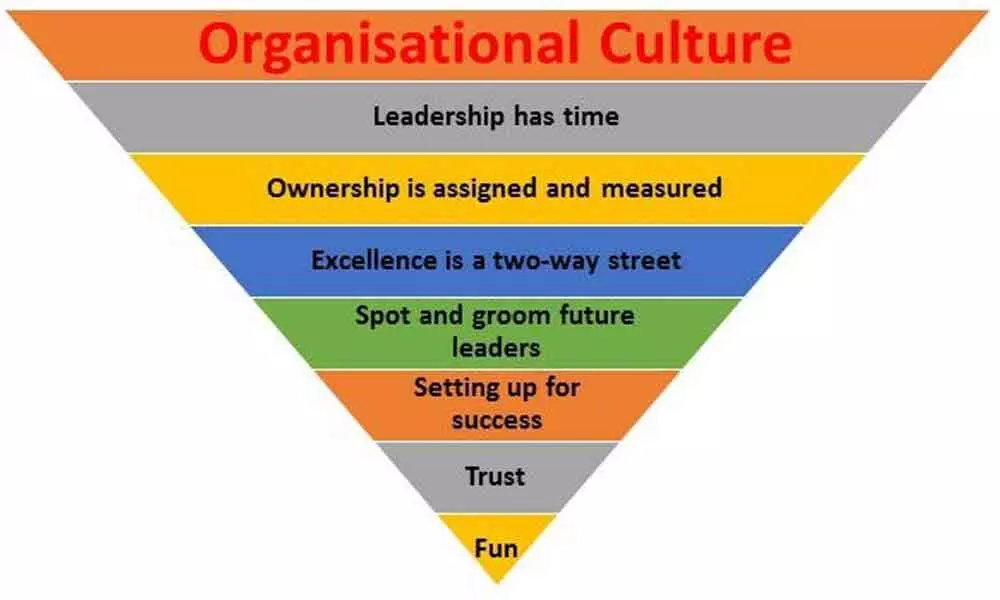Consequences of organisational culture

There are over 52 per cent Fortune 500 companies that have gone bankrupt since the year 2000. One can explore reasons for such huge organisations turning unprofitable and losing market value, or write them off as a phenomenon of natural death, driven by economic cycles.
There are over 52 per cent Fortune 500 companies that have gone bankrupt since the year 2000. One can explore reasons for such huge organisations turning unprofitable and losing market value, or write them off as a phenomenon of natural death, driven by economic cycles.
There are hundreds of companies which are delisted from stock markets across the world every year. Many unlisted, private firms do go out of business, shut down their operations, layoff millions of employees, exit from markets, sever ties with customers, and erode share-holder value.
I see 'organisational culture' as the critical and primary reason for this mammoth economic meltdown. Organisational culture exists in all organisations, whether they have five or 5,00,000 employees. The big question is, if the culture in an organisation is 'by-default' or 'by design'? Almost all the companies which have failed seem to possess an organisational culture, which is 'by-default' and not consciously, professionally well designed.
On the face of it, organisational -culture seems like a theoretical model for a mere administrative check-list. However, a CEO and his senior executive team need to be extremely congruent and emotionally intelligent to understand that organisational culture is central to all
efficiencies of an organisation, which impacts profitability and continuity.
A discerning organisational leader understands all processes internal and external to an organisation are driven by culture, which is adopted by employees with repeated pattern of behavior, overtime. Organisations can only control their end of active processes with well designed culture, and have very limited control over external functions of the market which are driven by divergent cultures.
If an organisation can't design, deploy and enable a structured organisational culture with the core objectives of enhancing share-holder value and customer value creation, that organisation is certainly setting itself on a path to failure.
If organisations don't invest their focus and resources into designing and enabling a robust organisational-culture, this deficiency steadily destroys precious organisational resources in the form of pilferage, wastage, lower productivity, unaccountable actions, bad employee behaviour, poor product design, low quality production, poor customer support, poor corporate communication and eventually low customer and share-holder value.
I will highlight few critical functions of an organisation which will essentially fail, without a well-designed organisational-culture.
Vision management
Vision is an organisational destination. Lack of well-designed organisational culture hinders the communication of vision all across the organisation. If the vision is not translated into actionable near term, mid-term and long-term business strategy, it can't be accomplished.
If the CEO or just few senior executives having a vision is not enough for an organisation to have vision-led guidance for sustenance and growth. When even large companies fail, they do because of the organisation's failure to communicate and act on the stated vision.
Organisations can design their culture which enables communication of organisational vision constantly across the organisation and even beyond. This essentially repetitive macro function is a critical factor to designing the organisational culture for an enterprise of any size. This culture enables value-guidance, resource allocation priority, choosing and rejecting business opportunities, quality standards, product design, product development, employee loyalty, customer and share-holder value creation.
Business strategy
I have consulted for many organisations where 'business strategy' was non-existent and it was not considered as an essential top management function. That's the established culture in these enterprises. These businesses were failing, were marginal players in the market, were struggling to compete, recruited below average human resource, and were unprofitable for years.
To me, all indicators are pointing at the 'organisational culture' as the core reason for their unenviable situation. Lack of functionally designed, actionable and reviewable business strategy. This is one of the key exhibits of any firm, which lacks professionally designed organisational culture.
If the functional head of an organisation doesn't find it necessary to have a well worked, actionable business strategy – what does it say about the culture of the organisation? What can be expected out of lower-level resource heads in reference to their resource plans? What kind of expectations will a share-holder or investor have on ROI in an organisation which doesn't have a business strategy to drive its operations?
Having a robust, result-centric, profit-driven and measurable business strategy is an essential function of any organisation, whether it is small, medium or large in size. What other reason than its own 'culture of negligence', 'culture of adhocism' or 'culture of ignorance' is stopping a CEO from playing his real role? The operational adhocism and irresponsibility of any functional head in an organisation is the direct outcome of a 'by-default' organisational culture or an 'ill designed' organisational culture.
Market & customer orientation
179 companies have been de-listed from US Stock Exchanges between 2020 to 2021. This is just a small slice of a much bigger pie of failed companies world-wide. How can possibly this many well-funded, professionally managed, publicly listed companies fail their shareholders and customers? The univocal answer is - it's their organisational culture which failed them.
The culture of management inertia, slow decision-making process, snail paced transformation, incompetence to manage market disruptions, poor resource allocation, visionless ness, bad profit formula, low quality human resource, dysfunctional business strategy and many other operational failures bring down even massive organisations. Every single function which drives negative outcomes contribute to the fall, and every organisational function is the outcome of an ill-formed or unprofessionally-designed organisational culture.
Organisations which continue to achieve market success, accentuate customer and share-holder value certainly possess an invaluable, unique organisational culture, which is designed, deployed and perfected overtime with application across the organisation. They are not just the best workplaces, the top talent chooses to work but also best enterprises who add compounding value to their customers, shareholders and to the global economy at large. Organisational culture is the heart of all successful enterprises.
The author is a Harvard Business School certified organisational strategist & an internationally renowned author.














